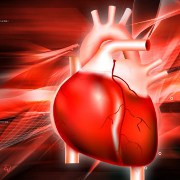 Monkey Business/Fotolia
Monkey Business/Fotolia
People who awaken suddenly at night feeling short of breath and gasping for air could be suffering from paroxysmal nocturnal dyspnea, particularly if they have cardiac disease.
The person finds she must immediately get out of bed or sit very upright, and may go open a window in an attempt to get more air. The entire experience is very scary, especially if it has not happened before.
"Paroxysmal" means sudden, "nocturnal" means night, and "dyspnea" means short of breath.
The mechanism behind PND is related to the fluid shifting that occurs when a person lies down at night to sleep. In a healthy person, fluid shifts are unperceivable.
In someone with cardiac disease, fluid that has seeped into the tissues during the day shifts back into the circulation at night, and the blood vessels carry the fluid to the heart and lungs.
A person with a poorly pumping heart cannot handle the extra fluid. It then gets backed up into their lungs, narrowing the space for air to come in and be exchanged for carbon dioxide.
PND can be confused with another conditions called orthopnea, which is a feeling of shortness of breath after lying down but is improved by sitting or standing.
A person who feels short of breath as soon as they lie down is considered to have orthopnea. A person with PND does not sense this diminished air exchange until a couple of hours have passed, then they bolt up out of bed, gasping for breath.
A person with PND frequently also has some swelling in her legs or feet (edema), which is caused by their poorly pumping heart not managing their circulation well. As the extra load of fluid returns to the heart, it is unable to manage the load.
Common cardiac causes for PND include:(2,4)
- Congestive heart failure
- Acute coronary syndrome (heart attack)
- Coronary artery disease
- Heart valve disease
- Chronic hypertension
- Having had episodes of orthopnea or dyspnea with exertion
There are also non-cardiac reasons for PND. PND is a term that may be used loosely to describe any sudden shortness of breath at night.
Non-cardiac causes of PND include:(2)
- Chronic respiratory diseases such as emphysema
- Sleep apnea
- Asthma
- Pulmonary emboli
What to do?
If you suddenly find yourself awakened with PND, regardless of cause, it is best to seek immediate medical attention as there is no way, without further testing and evaluation, to know what is causing it.
How is PND treated?
Doctors treat heart conditions with a variety of drugs to improve the function and oxygenation of the heart muscle. A physical exam, EKG and chest X-ray will be performed along with blood work to determine the best plan.
Diuretics, vasodilators and drugs to make the heart beat more strongly may be prescribed. Supplemental oxygen may be used as needed.
A reduced salt diet and a regimen to reduce one’s weight will be suggested, if needed.
Michele is an R.N. freelance writer with a special interest in woman’s health care and quality of care issues.
Edited by Jody Smith
1) Vaskar Mukerji. Chapter 11 Dyspnea, Orthopnea, and Paroxysmal Nocturnal Dyspnea. Clinical Methods: The History, Physical, and Laboratory Examinations. 3rd edition. Retrieved February 21, 2016.
http://www.ncbi.nlm.nih.gov/books/NBK213
2) Richard N. Fogoros, M.D. Heart Disease Expert Paroxysmal Nocturnal Dyspnea (PND). About Health.com. Retrieved February 21, 2016.
http://heartdisease.about.com/od/lesscommonheartproblems/g/Paroxysmal-Nocturnal-Dyspnea-Pnd.htm
3) Paroxysmal Nocturnal Dyspnea. How Stuff Works Health.com. Retrieved February 21, 2016.
http://health.howstuffworks.com/diseases-conditions/respiratory/paroxysmal-nocturnal-dyspnea.htm
4) Shortness of Breath When Lying Down, Sleeping or at Night. HealthHype.com. Retrieved February 21, 2016.
http://www.healthhype.com/shortness-of-breath-when-lying-down-sleeping-or-at-night.html




Add a CommentComments
There are no comments yet. Be the first one and get the conversation started!